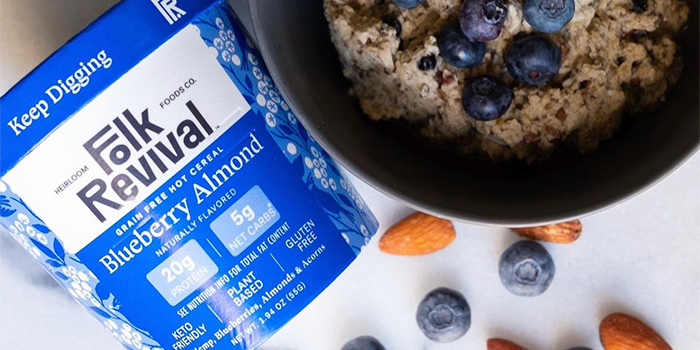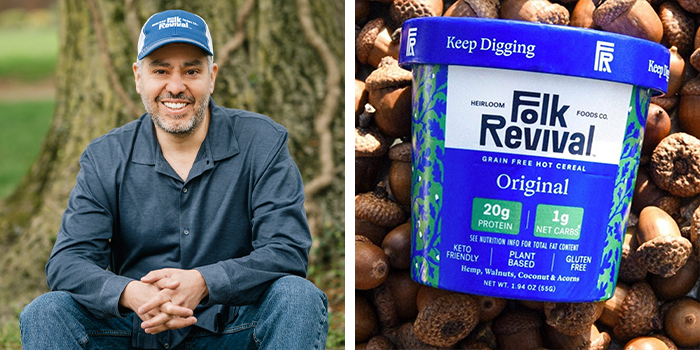Nuts for Acorns: Folk Revival Launches Acorn-Added Cereal Cup Line

Winter hibernation may be over, but New York-based startup Folk Revival is taking a cue from the squirrels with its line of hot cereal cups featuring a healthy serving of acorn.
Founded in 2021 by CEO David Cantor, Folk Revival is a line of grain-free hot cereal cups made with hemp, nuts, coconut and, its hero ingredient, acorns. The line is currently available in four flavors – Original, Blueberry Almond, Maple Walnut and Chai Almond – and is sold in retail for $3.99 per 1.94 oz. cup or online in 6-packs for $23.99.
Folk Revival is the first entrepreneurial venture for Cantor, who brings more than two decades of regenerative agriculture and CPG marketing experience to the role. Following his college graduation, Cantor worked as a farmer in New Mexico before joining Mars in 2003, where he served in the candy conglomerate’s health and nutrition division, later becoming the marketing manager for organic brand Seeds of Change.
After roles at Novartis, Steuben Foods and Terrace Marketing, he spent seven years as VP of Marketing at plant-based frozen food company Dr. Praeger’s Sensible Foods from 2014 until shortly after its acquisition by Vestar Capital Partners in 2021.
“For over 20 years I’ve been growing startup natural organic brands for other people; Startup brands, high-growth challenger brands, things like that. And I really was itching to do something for myself, and I really felt like I had the idea and the wherewithal to pull it off.”
Cantor said the idea for an acorn-based oatmeal brand came from his own kitchen experimentation while trying to create a lower-carb breakfast: “Eating a big bowl of oatmeal is sort of like eating a giant bagel,” he said. Drawing from his roots in regenerative agriculture and a longtime passion for heirloom foods Cantor began working on developing a lower-carb recipe, ultimately adding acorns, seeds, nuts and coconut.
Acorns have been eaten around the world since antiquity, including in Greece, Japan and Iberia, and they remain in use in Korea through dishes like the jelly dessert dotori-muk. Acorns are also a traditional ingredient in many indigenous American cuisines, particularly among tribes in California where dishes like wiiwish made up a sizable portion of peoples’ diets. Folk Revival also isn’t alone in reintroducing acorns to the plate: at least one Native American-owned company, Arrow’s Native Foods, has set the goal of revitalizing the ingredient. Native American restaurants across the country have also contributed to the revival by adding acorn cakes and other dishes to their menus.
“Essentially, we’re taking this ingredient that’s very familiar to everyone – every kid knows what an acorn is, they find them in their backyard or on playgrounds – and they’re eaten here and there around the world, but they’re largely not eaten here,” Cantor said.

While consumer education about acorns will be important as Folk Revival raises brand awareness, Cantor compared it to coconut water – a product that Western consumers were largely aware of but had not personally tried when innovative brands introduced it to the mainstream in the mid-2000s.
In making the pitch, Cantor said Folk Revival intends to highlight the nutritional benefits of acorns, which are high in protein, low in carbs and are keto-friendly. Thanks to its blend of hemp, nuts and seeds, Folk Revival’s cereal cups contain 20 grams of protein per serving and are gluten free, which has helped to draw early consumers in, while the use of acorns – which is less pronounced on the packaging – piques curiosity.
“We’re trying to strike the right balance between the functional benefits of a high protein oatmeal, which is a key trial driver, and then the sustainability mission of reviving heirloom and heritage foods, which is a little bit more esoteric,” Cantor said. “This is an opportunity to educate consumers about the benefits of heirloom heritage ingredients and how they build diversity into the food system.”
While heirloom ingredients is the cause du jour for Folk Revival, its branding ties the mission into Cantor’s love of music — a theme he hopes to carry over into marketing campaigns. The name refers to the American folk music revival, a period stretching from roughly the 1940s to the 60s when acoustic folk returned to mainstream prominence with the rise of artists like Woody Guthrie, Odetta and Bob Dylan. Though the brand does not currently have specific marketing campaigns lined up, Cantor – himself an amateur guitarist – said the tie to music could potentially open doors to future partnerships with musicians, festivals and other event activation opportunities, and speaks directly to an existing community of folk fans.
In addition to selling online, Folk Revival is available at retail in roughly 50 stores in New York, including Citarella Gourmet Market, serviced by a local New York DSD distributor and KeHE. Cantor added that he hopes to be in 100-200 stores by June, growing distribution to roughly 1,000 stores by the end of the year.
Although the business is small, Cantor said he’s been encouraged by strong repeat customer rates – with a number of online consumers who are now on their “fourth, fifth, sixth purchase cycle” since Folk Revival first launched ecommerce sales in December.
With five partners, the company has been financially bootstrapped to date, but Cantor said he is now seeking investment to help grow the company, with plans to put the funding towards slotting fees, inventory, marketing support and other early stage hurdles.
“We have this little beachhead, a little proof of concept. Now it’s how do we intelligently and strategically scale this and invest in this so we can actually become a player,” he said. “But we don’t want to get too big, it’s all about crawling, walking, running and making sure that we’re learning as much as possible rather than growing as quickly as possible.”

















